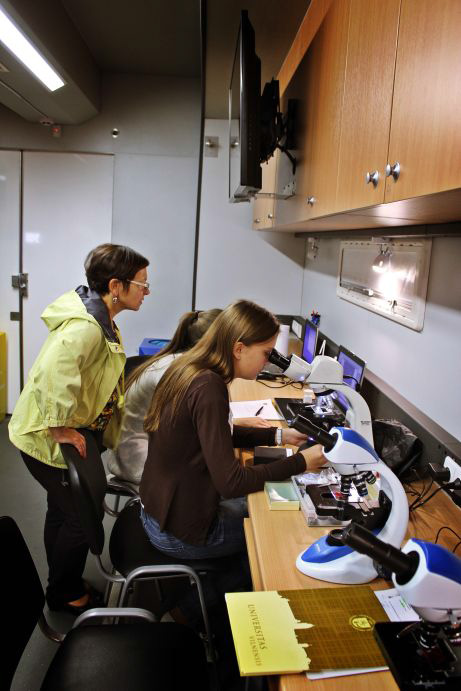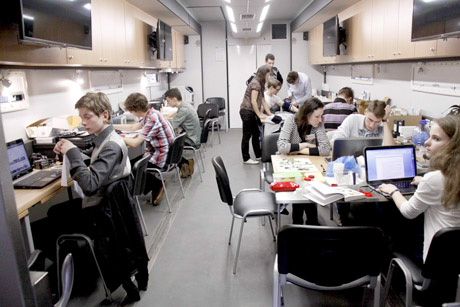The truck is equipped with scientific equipment, there are 20 work places, 30 students can listen to lectures. Not less than 10 scientific works per visit. Not less than 15 students participate in the activities at one time.
- Stages/ methodology:
- Preparatory stage: a student with the help of the teacher:
a- Reads about the Young Explorer’s project, aims of the visit;
b- Decides to perform a scientific research during the visit;
c- Formulates idea he / she would like to develop and registers in Young Researcher’s portal. - Visit stage: a student with the help of the scientist:
a- Is introduced with safety features in MoMoLab
b- Learns to work with the equipment and the planned research
c- Performs initial data analysis and plans further steps - Continuous stage: after the visit with the help of the scientist:
a- Systematizes research data, upon necessity performs additional research;
b- Performs final data analysis
c- Prepares research report
After the visit the student with the help of the teacher or scientist:
a- Further continues his / her research based on the gained experience, performs another research;
b- Performs scientific research and prepares work description;
c- Participates in the EU contest of your scientists.
The aims:
- to help students to reveal their abilities to explore the surrounding environment and nature,
- to create and find new technological solutions,
- to reveal students’ talents,
- to promote STEAM,
- to develop the features possessed by researchers,
- to introduce contemporary research methods and materials,
- to make science popular,
- to let students to experiment themselves,
- to initiate new ideas and new directions of work,
- to raise questions and search for the answers
The educational programme lasts for 2-3 days where students from 7 to 11 grade/ class perform scientific works together with scientists, participate in lecture about science innovations, observe and make scientific experiments, create and implement scientific ideas. The researches performed are in the field of physics, biology, nature science, electronics and robotics, image and data analysis and even astronomy.
The programme of the visit is prepared in advance according to the field of interests of students. Students have to send their ideas they want to explore in advance to the organisers.
Some topics as examples: to make a research on electromagnetic field of cell phones and its impact on a human, noise level and air pollution, to answer the question why different foods have different colours, what is the chemical composition of an egg or milk, how to make oxygen or grow herbs during the night, the chemical structure of a straight and a curly hair, etc.
After performing the research on a chosen topic, students have to present their findings to the whole group and school community, to prepare a report and send it to the supervising scientists.
Later, after the project the opportunity is given to students to continue working on their research projects and participate in different contests.
Some students express their wish to continue working in the field of science.
This gives an opportunity to students to gain practical skills of scientific work.
- Competences tested:
Perceptivity, preparation, ability to test the „universal truths“, the theory tested in practice, ability to use the theoretical knowledge, to connect knowledge of different subjects,
- Connection to active citizenship:
- Themes chosen and results obtained are useful for the whole community, for example,:
a- To explore pollution in the village wells;
b- The impact of music to the blood pressure;
c- The impact of stimulating drinks on the blood pressure;
d- To explore antioxidant qualities of thyme, caraway and currants; - Promoting STEAM to make life of people easier in the future.

